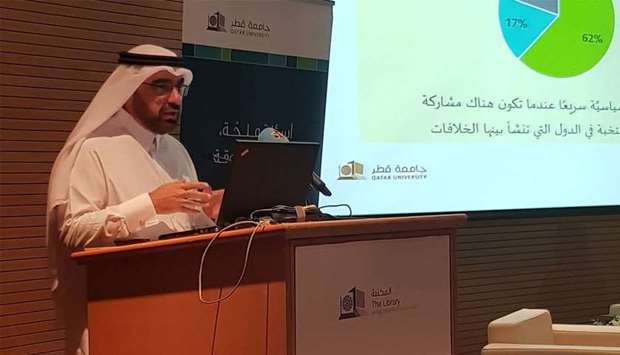About 98% of Qatari nationals are satisfied with the government’s performance during the crisis and 88% believe that Qatar is able to survive under this crisis for many years, a Qatar University (QU) survey has found.
The Social & Economic Survey Research Institute (SESRI) at QU on Monday unveiled the results of the survey study on the Qatari citizens’ points of view about the Qatar’s blockade from a legal, political, economic, and social perspective.
The study, titled “Qatar against the blockade”, was supervised by a team of Qatari experts and researchers including SESRI director Dr Hassan al-Sayed, SESRI head of policy department and the study’s project manager Dr Majed al-Ansari, QU College of Business and Economics dean Dr Khalid Shams M A al-Abdulqader, QU Sociology Programme coordinator Dr Fatima Ali Hussain al-Kubaisi, and Ministry of Foreign Affairs official spokesperson Lulwah al-Khater, as well as a number of Qatari research assistants at SESRI.
The study was conducted in November 2017 through telephone interviews. A random sample of 889 Qatari nationals (18 years old and above), who are currently in Qatar, provided their points of view about the Qatar’s blockade from a legal, political, economic, and social perspective.
From the legal perspective, Dr al-Sayed noted that the study showed that around 62% of Qatari nationals agree and 17% of them do not agree that the participation of citizens through elected councils does not lead to the fast deterioration of political conflicts between countries. These results highlight the awareness of Qatari citizens about political issues due to the crisis.
The study also revealed that 67% of Qatari nationals find that it is important to live in a democratic country. These results show an improvement as they doubled since a recent study conducted a few months prior to the blockade (34%).
From the political perspective, Dr al-Ansari observed that 90% of Qatari nationals are interested in watching the news in order to get acquainted with the daily progress of the crisis. He noted that 62% of Qatari nationals find that Qatar should achieve full independence of regional alliances, which highlights the lack of trust in the regional environment. In this context, 86% of Qatari citizens find that Qatar should explore alliance opportunities with new countries in the region.
Dr al-Ansari also noted that 79% of Qatari nationals consider that Al Jazeera Channel serves the Qatari interests and that the channel has played an important role in resisting the “media war” by the media outlets of the siege countries against Qatar. The results also showed Turkey as Qatar’s first ally (72%), while Kuwait came second (16%), followed by other countries (12%).

